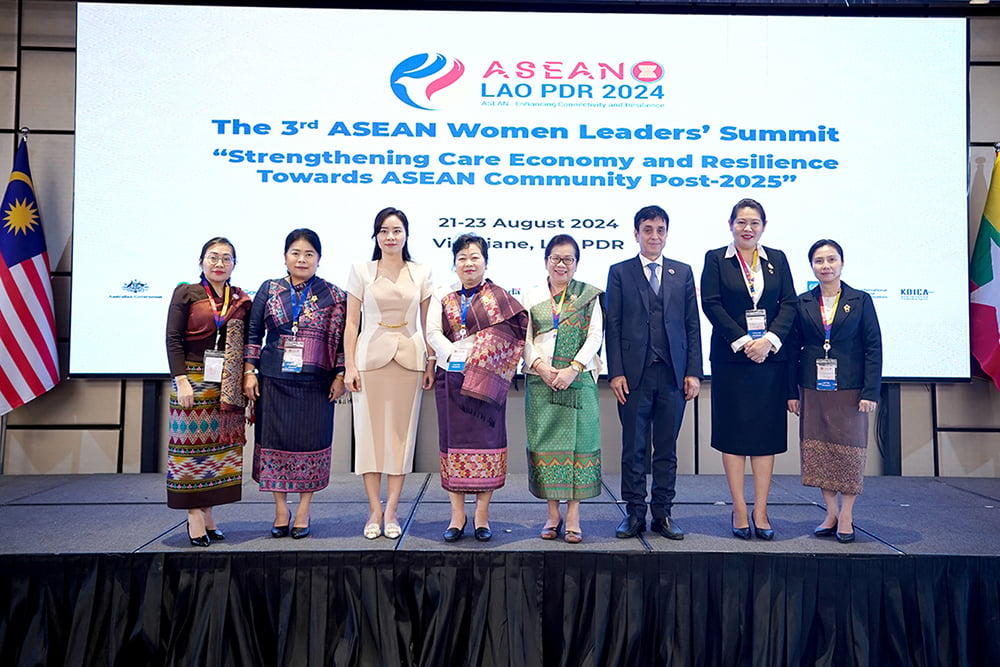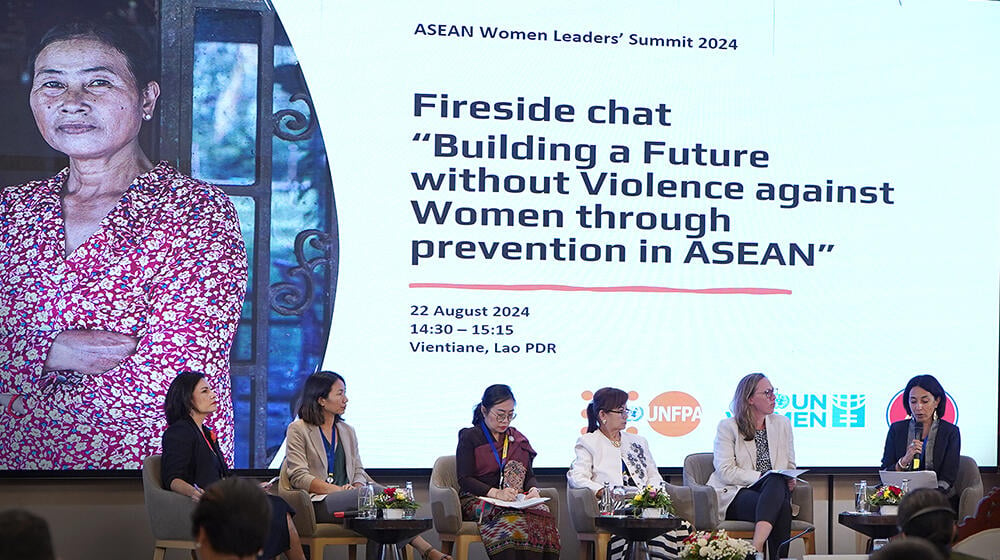Joint Opinion Editorial by UNFPA Representatives in Lao PDR, and Viet Nam and Country Director of UNFPA Thailand
Dr. Bakhtiyor Kadyrov, Mr Matthew Jackson, Dr. Julitta Onabanjo
"Opening Every Door: A United Call to Support Survivors of Gender-Based Violence in Southeast Asia"
In Southeast Asia, deeply ingrained traditional gender norms often designate women and girls as primary caretakers, leading to a stark gender imbalance in both household responsibilities and societal roles. This deeply embedded gender bias, along with the uneven distribution of unpaid care work, exacerbates the challenges women face, often trapping them in abusive situations and perpetuating a cycle of inequality and economic dependence. Over time, women's autonomy and decision-making power are eroded, increasing the risk of domestic violence - a global crisis hidden in plain sight.
Take Lao PDR, for example, where nearly one-third of women have faced physical, sexual, or emotional violence by a romantic partner in their lifetime—reflecting a regional and global pattern rooted in deep-seated social and gender norms. Viet Nam's situation is similarly troubling: a 2019 national study on violence against women found that nearly two-thirds (63 per cent) of ever-married women experienced violence, with a staggering 90.4 per cent never seeking help. The economic cost of such violence amounted to 1.81 per cent of national GDP in 2018. In Thailand, despite progress, 44 per cent of women still report intimate partner violence, highlighting ongoing challenges. Each of these national statistics underscores a broader global crisis of violence against women, driven by entrenched inequalities and systemic hurdles.
The Governments of Lao PDR, Viet Nam, and Thailand, supported by UNFPA and partners including UN Women, UNDP, WHO, UNODC, the government of the Republic of Korea through KOICA, Australia (DFAT), and Japan, have made significant strides in combating gender-based violence, through the implementation of the Essential Services Package for Women and Girls Subject to Violence (the ESP)–the global gold standard in institutional responses to gender-based violence. Across the three ASEAN countries, comprehensive support systems like One Stop Service or Crisis Centers have been established in hospitals or within the social sector, and harmonised Standard Operating Procedures have been developed covering health, social, justice and police sectors, as well as efforts to strengthen national hotlines for survivors. In addition, the ongoing integration of services into Thailand's Universal Health Coverage system is a promising step towards ensuring that all survivors receive the support they need without financial barriers.
The remarkable progress achieved in Lao PDR, Viet Nam and Thailand is a testament to the strong commitment by the governments and the systematic application of South-South triangular cooperation. This approach has proven to be a powerful model in addressing gender-based violence through the sharing of knowledge, resources, and innovative practices. The collaboration among these three countries embodies the spirit of ASEAN, including co-hosting a side event at the recent 68th Commission on the Status of Women, in-person and virtual study exchanges, joint site visits, and cross-border collaborations for the 16 Days of Activism Against gender-based violence, which is marked globally, every year.
This week, during the 3rd ASEAN Women Leaders’ Summit titled “Strengthening the Care Economy Towards the ASEAN Community Post-2025,” Lao PDR, Thailand, and Viet Nam will join forces once again in a side event titled: “No Wrong Door”: Sharing good practices on GBV response coordination, protection, social services, referral pathways and health system response”. Together, they will offer over 200 participants practical recommendations based on their success in implementing standard operating procedures that align with international standards to ensure survivors of violence receive the essential care and support they need, and to fortify institutions at both national and sub-national levels.
The lessons from Lao PDR, Viet Nam, and Thailand are clear:
- There should be "No Wrong Door" for survivors of violence to find the help they need, wherever they turn.
- Integration of the essential services package into national-level laws and policies is critical to guide effective implementation.
- Addressing gender-based violence requires a holistic and multi-sectoral approach that simultaneously challenges the underlying gender norms and structures that perpetuate violence.
- It is not enough to provide services; we must also work to change social norms, ensuring that survivors are supported in the aftermath of violence and are empowered to prevent it from happening. A foundational step in preventing gender-based violence lies in recognizing and valuing the vital role of care work, coupled with a conscious effort to redistribute these responsibilities more equitably. This entails challenging traditional gender roles and ensuring shared responsibility where both men and boys actively advocate for and support equal access to resources, opportunities, and services for everyone, regardless of gender.
The strong national commitment of Lao PDR, Thailand and Viet Nam to the 1994 International Conference on Population and Development (ICPD) and the 2030 Sustainable Development Agenda (SDGs) has played a pivotal role in advancing the pledge to end GBV and promoting gender equality. By emphasising the interconnection between population dynamics, human rights, and sustainable development, these three countries have laid the foundation for policies and programmes that address the root causes of gender-based violence and empower women and girls. This is a crucial step towards achieving shared goals of peace, prosperity, and social justice.

As we continue to build on the ICPD's legacy 30 years on, it is essential to maintain a relentless focus on ending gender-based violence, not least as the cost of inaction is too high—not only in economic terms but in the continued suffering of countless women and girls in ASEAN countries and around the world. When we work together, joining forces across borders, we can break the cycle of violence and ensure that any door a survivor walks through seeking help–be it a hospital, a shelter, or a police station–is the right one.


